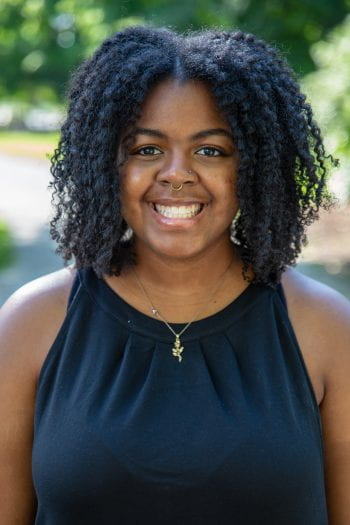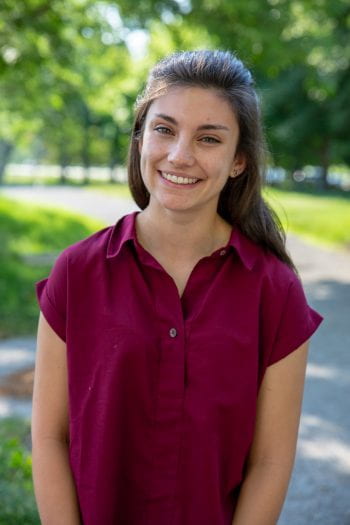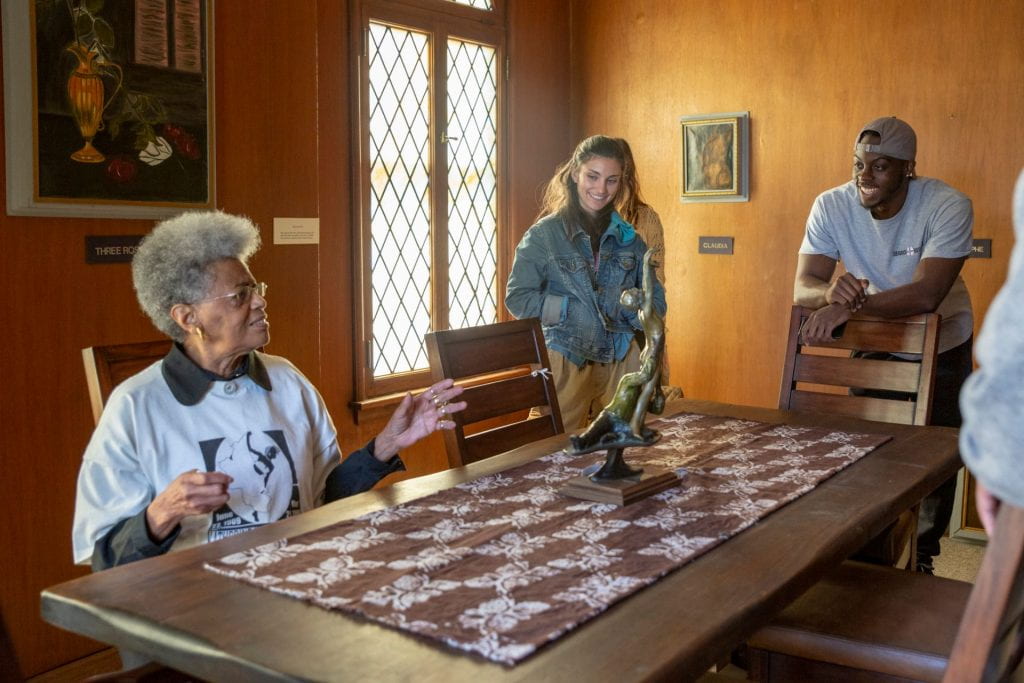Even a cursory glance at a map of the hospitals in St. Louis quickly reveals the uneven access to healthcare in the region, divided along longstanding, historically rooted lines of class, race, ethnicity, and geography. The World Health Organization defines health equity as the idea that “everyone should have a fair opportunity to attain their full health potential and that no one should be disadvantaged from achieving this potential.” Community organizations and local nonprofits like Jamaa Birth Village and Casa de Salud are working tirelessly to provide healthcare to vulnerable and underserved communities in St. Louis. These organizations also partner with the Gephardt Institute through the Goldman Fellows Program to train the next generation of leaders working toward equity.
Nia Plump, class of 2021, and Carmen Vescia, class of 2021, are members of the 2019 Goldman Fellows cohort. The Goldman Fellows Program supports undergraduates in unpaid summer internships at nonprofit, community, or governmental organizations in the St. Louis region. In addition to a summer stipend in lieu of wages, the fellows are a part of a robust community of like-minded students with built-in professional development opportunities to engage with St. Louis neighborhoods, culture, and leaders. Nia and Carmen both spent their summers working for nonprofits whose missions center around health equity.

Nia (pictured left) interned at Jamaa Birth Village, a midwifery and doula organization in Ferguson, Missouri. Jamaa provides perinatal care to local families, working to lower infant and maternal mortality/morbidity rates, which are significantly higher for African-American women. Brittany “Tru” Kellman, Founding Director and Clinical Midwife at Jamaa Birth Village, said Nia “brought great ideas and vibrancy to the organizations and to all the projects she worked on.”
Nia assisted with a variety of projects and tasks over the summer, organizing group sessions, spending time with mothers, and gathering information for clients. Much of her time was spent doing intakes with expectant mothers and explaining their options and the services offered by Jamaa. Nia aimed to help in creating an inviting and welcoming environment. “Hospitals can be intimidating, and they’re often too far away for prenatal care for families in Ferguson,” she explained. Jamaa does not stop supporting families post-birth. Nia helped clients create birth plans and assisted families in thinking about how to center their lives around their new baby and how to be healthy parents. “Midwifery care is holistic,” Nia emphasized.
In 2020, Jamaa will expand into a full birthing village. Through the planning process, Tru noted that it was especially valuable to have Nia on board to help work through logistics. One of Nia’s proudest accomplishments was writing a grant application for windows for the new building.
Nia grew up about five minutes away from Jamaa, so she understood and was invested in the community on a deep and personal level. As a WashU student returning to her own community, Nia was proud of the contribution she was able to make and grateful for what she was able to learn. “After living in Clayton for a while, I was glad to reconnect to Ferguson,” she said. “I had never met the people who came in, and I enjoyed getting to know them and hearing their thoughts on community development.” On Nia’s impact, Tru said, “It helped having an extra person who was a part of the community. Nia actually lived in Ferguson, so her input was especially relevant.” Many WashU students are not from the St. Louis region, and Tru encouraged them to think carefully about the impact of choosing work or volunteer placements outside of their own communities. “Do your own work prior to entering a community,” she urged. “Address your own biases and check them, or at least become aware of them so that you can be honest with yourself and others.”

Carmen Vescia (pictured left) interned at Casa de Salud, whose mission is “to facilitate and deliver high quality clinical and mental health services for uninsured and underinsured patients, focusing on new immigrants and refugees who encounter barriers to accessing other sources of care.” Community Engagement Coordinator Ruth Vilches shared that summers can be difficult at Casa since during the school year they have such a strong base of student volunteers. Carmen was able to fill some of the gaps by providing medical interpretation, accompanying patients to appointments, and helping patients apply for financial assistance. She also worked on administrative tasks and projects that, Ruth explained, “helped promote long-term sustainability,” such as creating a digital interactive map of urgent care centers in the region.
In her role, Ruth is invested in helping to launch interns into community engagement work. She emphasized the importance of the support and education provided by the Goldman Fellows Program that deepens students’ experience at Casa. Ruth said, “The program is great because the fellows get support outside of our internship. I know that they have a community and are seeing other aspects of St. Louis. I appreciate the exposure Goldman Fellows have to St. Louis’ history, community, and nonprofit world.” Carmen agreed that the cohort experience was an invaluable part of her summer, from the conversations that the fellows shared to their immersion experiences in St. Louis.
For Carmen, the most impactful aspect of her summer was the way that she was able to connect with St. Louis. Like many students, she struggled in her earlier years of college to break out of the so-called WashU bubble. As a Goldman Fellow, Carmen said, “I was able to come to know St. Louis in a different way. I was grateful for the opportunity to meet people and hear different perspectives on WashU. I feel more like I’m really living in St. Louis now.” Carmen is ensuring that her connection to the community does not end with the program by making a conscious effort to continue learning about the city and connecting with its residents. Ruth encouraged other students to do the same. “By nature, we are in community,” she explained. “Students are doing community engagement whether they know it or not, and that can be helpful or harmful depending on the context, but there is no neutral ground. We want to give students the tools to do community engagement well.” This is exactly what the Goldman Fellows Program aims to accomplish, as students are encouraged to pursue their own passions and connect in meaningful ways with St. Louis communities.
Community partners like Jamaa Birth Village and Casa de Salud who are investing in the community and in student leaders make the Goldman Fellows Program a profound and transformative experience that lasts far beyond a single summer. Students are able to increase the capacity of nonprofits while learning from local leaders about issues like health equity. They leave prepared for deeper and more meaningful engagement and action.
For students: Learn more about the Goldman Fellows Program here.
For community partners: Learn about ways to partner with the Gephardt Institute here.
The Goldman Fellows Program is generously supported by the Joyce and Irving Goldman Family Foundation. Since 2008, the program has supported 125 Goldman Fellows at 91 different nonprofit, community, and governmental organizations in St. Louis.
